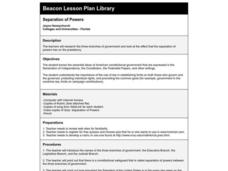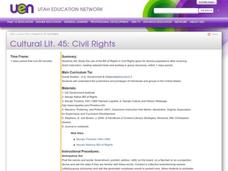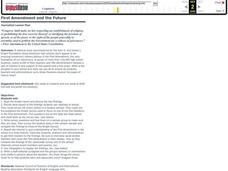Curated OER
1856-1865: Abolitionists and the Civil War
Students explore the concept of philanthropy. In this abolition lesson, students watch "Uncle Tom's Cabin" and discuss the philanthropic acts they witnessed in the film. Students also complete an activity that requires them to determine...
Curated OER
The United States Flag
Students discover the meaning and symbolism behind the American flag. In this lesson on National symbols, students design a flag for their school, explain the symbolism they used, and distinguish the elements that constitute the US Flag....
Curated OER
Mapp v. Ohio (1961)
Students examine warrantless searches and due process. In this Supreme Court lesson, students examine primary documents from Mapp v. Ohio and discuss the implications of the decision.
Curated OER
The Branches of Government
After reviewing and reading about the three branches of US Government, complete this activity with your class. In groups, they will place their "cards" on the board under the correct branch. This lesson is weak and unclear. I'd make a...
Curated OER
Separation of Powers
Eighth graders research the three branches of government and examine the effect that the separation of powers has on the presidency. They explain the importance of the rule of law in establishing limits on both those who govern and the...
Curated OER
Fugitive from Labor Cases: Henry Garnett (1850) and Moses Honner (1860)
Students engage in the comparison of cases which demonstrate the increasingly volatile political crisis in the 1850s arising over the issue of slavery and the necessity for the enactment of the 13th, 14th, and 15th Amendments to the U.S....
Curated OER
Executive Orders
Students interpret historical evidence presented in primary and secondary resources. In this foreign policy lesson, students examine U.S. foreign policies of Presidents since World War II. Students prepare PowerPoint...
Curated OER
Barriers to Immigration: The Chinese Exclusion Act
Students study the Chinese Exclusion Act and its impact on the Chinese here in the US and abroad. They watch a video, then perform research which is guided by worksheets imbedded in this lesson plan.
Curated OER
Basic Workplace Rights
Young scholars study basic workplace rights and the limits of those rights. They determine how many of the rights guaranteed in the Constitution only regulate governmental actions, not private actions. They examine the concept of at-will...
Curated OER
Child Abuse and the Trial Process
Students identify the elements of child abuse and neglect. Using this information, they relate it to the laws in their home state. They read scenerios and ask questions to determine if child abuse is present. They review the trial...
Curated OER
Understanding by Design
Fourth graders examine the origins, structures, and functions of the Colorado government. In this understanding by design lesson, 4th graders explore the three branches of government. Students identify the roles of state leaders and...
Curated OER
The My Lai Courts Martial of 1970
Students research the My Lai Massacre and trial. Students discuss the events and the trial, reviewing the constitutional amendments and concerns related to the massacre. Students write an analysis of photographs related to the incident.
Curated OER
Frederick Douglas
Fourth graders explore the African Americans resistance to slavery. In this US History lesson, 4th graders read excerpts of a speech by Frederick Douglas.Students develop a position of right or wrong to certain situations within...
Curated OER
The Louisiana Purchase
Second graders explore the Louisiana Purchase. In this U.S. history lesson, 2nd graders examine the purchase of the Louisiana territory by the United States as they read text, take notes, complete homework, and take a quiz.
Curated OER
Let Freedom Ring
Students go to the computer lab to engage in this thoughtful lesson on our national symbols. Students access the internet, and solve an on-line puzzle of a national symbol of freedom. The symbols are the Eagle, The Statue of Liberty, The...
Curated OER
Redistricting: How Our Representatives Select Voters
Students examine the practice of redistricting. In this American politics activity, students read the provided articles "The Gerrymander," and "Reforming the Gerrymander." Students respond to the provided discussion questions.
Curated OER
We the Second Graders
Students study the history, development and meaning of the Constitution. They participate in a classroom simulation of the Constitutional Convention by writing a Preamble, developing a government, and writing a Bill of Rights for their...
Curated OER
With Liberty and Justice for All
Fifth graders identify and define in their own words the first ten amendments to the Constitution. They are assigned a CDV or amendment from the Bill of Rights and create and present a one-minute skit demonstrating it.
Curated OER
Constitutional Issues: Separation of Powers
Young scholars discribe the principle and the history of separation of powers.
Curated OER
Zora Neale Hurston:Fighting Jim Crow through the All-Black Community
Students explain the importance of equality of opportunity and equal protection of the law as a characteristic of American society and evaluate the validity and credibility of different historical interpretations.
Curated OER
The U.S. & Navajo Bills of Rights
Middle schoolers are introduced to the United States and Navajo Bill of Rights. In groups, they compare and contrast the two documents and take notes to share with the class. To end the lesson, they write in their journals about their...
Curated OER
the Impact of the U.s. Supreme Court on High School Journalism.
Learners study of the First Amendment, Tinker, Hazelwood and the Colorado Student Free Expression Law. They discuss the ramifications on the student press and recite their memorized First Amendment rights. They discover what can...
Curated OER
Civil Rights
Students are introduced to the concept of Civil Rights. In groups, they use a timeline of the Navajo tribe to identify the ways the tribe has made advances in Civil Rights throughout the years. To end the lesson plan, they take notes...
Curated OER
First Amendment and the Future
Students read the Knight report and discuss key findings before deciding what aspects of the findings students can replicate in their own school and conduct a survey. They write survey questions and test them on sample group before...

























